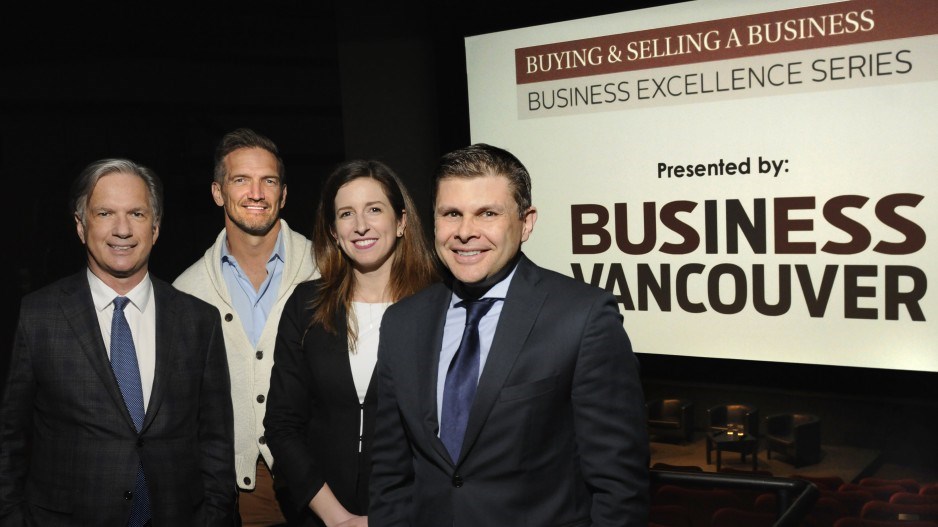Studies estimate that as many as 4.5 million companies holding more than US$10 trillion in business value will be changing hands in North America alone over the next decade.
This massive shift of wealth is spurred by the baby boomers approaching retirement, many of whom will be looking to sell a business they have spent entire careers building from the ground up. Panellists at Buying and Selling a Business, the latest in Business in Vancouver’s Business Excellence Series, held April 17 at the Vancity Theatre, tackled the ongoing wealth succession issue and many other topics related to the art of the deal.
Erica McGuinness, the vice-president for Sequeira Partners Inc., said timing is huge for buyers or sellers. She used an analogy of a three-legged stool to describe a successful transaction process.
“The first thing is the market,” she said. “Where are valuations at and is it a great time to be a seller? And confidently now for a number of reasons I can say, ‘Yes.’ It’s usually a thing that gets checked off the box quickly right now.”
Canada’s economy has been chugging along recently. The latest International Monetary Fund World Outlook Report has the country’s economic growth pegged at 2.1% for 2018, while the overall global economy is expected to grow 3.9%.
McGuinness said the second leg of the stool is an internal question if you’re a seller.
“Is it the right time for your business? So have you just invested in a new facility where you’re not seeing the positive cash flow from that investment yet? Have you [as a founder or operator] not found your replacement yet, so you’re still doing the day-to-day and have not taken steps to make yourself redundant?”
McGuinness said the final question is emotional for both buyer and seller.
“Looking at your personal objectives, is this a good time to retire? Do you maybe want to slow down and bring on another partner? So starting to find out how your own personal family objectives fit into the landscape.”
Cameron Chell, the co-founder and chief executive officer for the Business Instincts Group, is a serial entrepreneur with more than 25 years’ experience in the technology, energy and finance sectors. Chell has founded several ventures, including DraganFly, Raptor Rig and is the co-creator and architect of KokakCoin, a photographer-orientated cryptocurrency.
He said emotions play a much more significant part in buying or selling a business than most people expect.
“I’d say it’s about 90% emotions, 10% economics. And some of the economics just help validate your emotions. Depending on what your emotions are, you allow the economics to justify them. So this sounds a bit extreme, but I would suggest some really good coaching or counselling sessions before the process starts.”
Harvard Business School Prof. Gerald Zaltman noted in an interview with the university’s magazine that 95% of consumers’ purchase decisions take place unconsciously and thus most of the financial choices we make in life are emotionally based.
Chell added that there’s another personality trait that has to be taken into account.
“Getting your ego out of the way is a big issue, for me at least. I’ve seen it multiple times over and over with sellers and founders, if there’s some level of maturity where you can get your ego off the table, likely your transaction and transition will be a lot more successful.”
British Columbia could be at the heart of a massive small-business succession plan over the next few years. According to provincial government statistics, approximately 98% of businesses in British Columbia are small, and with 83.4 small businesses per 1,000 people, the province had Canada’s highest per capita rate of small businesses.
Loren Mallett, a partner with Alexander Holburn Beaudin + Lang LLP, leads the company’s corporate/commercial and intellectual property and technology groups. Mallett has more than 18 years’ experience helping clients negotiate purchase and sale agreements ranging in value from $500,000 to $100 million. He said the final emotion can almost manifest itself as a symptom.
“Sometimes deal fever can be a problem,” he said. “On the purchasers’ side, you’ve invested, you’ve spent a lot, lawyers are expensive. You’re invested in the transaction, and my mentor often taught me that the first loss is often the best loss, so losing out on the first deal may benefit your bottom line better than you think.”




